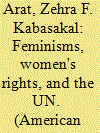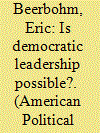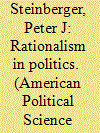|
|
|
Sort Order |
|
|
|
Items / Page
|
|
|
|
|
|
|
| Srl | Item |
| 1 |
ID:
143140


|
|
|
|
|
| Summary/Abstract |
The aim of this article is to read Frederick Douglass as a theorist of democracy. It explores the hemispheric dimensions of Douglass' political thought, especially in relation to multiracial democracy. Douglass is generally viewed as an African-American thinker primarily concerned with U.S. politics, and the transnational scope of his ideas is rarely acknowledged. Instead, this article traces the connections between Douglass’ Caribbean interventions and his arguments about racial politics in the United States. It argues that Douglass not only found exemplars of black self-government and multiracial democracy in the Caribbean and Central America, he also sought to incorporate black and mixed-race Latin Americans in order to reshape the contours of the U.S. polity and challenge white supremacy. Viewed though a hemispheric lens Douglass is revealed as a radically democratic thinker whose ideas can be utilized to sketch a fugitive democratic ethos that contains important resources for contemporary democratic theory and comparative political theory.
|
|
|
|
|
|
|
|
|
|
|
|
|
|
|
|
| 2 |
ID:
143139


|
|
|
|
|
| Summary/Abstract |
Although all theories that oppose the subordination of women can be called feminist, beyond this common denominator, feminisms vary in terms of what they see as the cause of women's subordination, alternatives to patriarchal society, and proposed strategies to achieve the desired change. This article offers a critical examination of the interaction of feminist theories and the international human rights discourses as articulated at the UN forums and documents. It contends that although a range of feminisms that elucidate the diversity of women's experiences and complexities of oppression have been incorporated into some UN documents, the overall women's rights approach of the UN is still informed by the demands and expectations of liberal feminism. This is particularly evident in the aggregate indicators that are employed to assess the “empowerment of women.” In addition to explaining why liberal feminism trumps other feminisms, the article addresses the problems with following policies that are informed by liberal feminism. Noting that the integrative approach of liberal feminism may establish gender equality without empowering the majority of women, it criticizes using aggregate indicators of empowerment for conflating sources of power with empowerment and making false assumptions.
|
|
|
|
|
|
|
|
|
|
|
|
|
|
|
|
| 3 |
ID:
143148


|
|
|
|
|
| Summary/Abstract |
How do persistent terrorist attacks influence political tolerance, a willingness to extend basic liberties to one's enemies? Studies in the U.S. and elsewhere have produced a number of valuable insights into how citizens respond to singular, massive attacks like 9/11. But they are less useful for evaluating how chronic and persistent terrorist attacks erode support for democratic values over the long haul. Our study focuses on political tolerance levels in Israel across a turbulent 30-year period, from 1980 to 2011, which allows us to distinguish the short-term impact of hundreds of terrorist attacks from the long-term influence of democratic longevity on political tolerance. We find that the corrosive influence of terrorism on political tolerance is much more powerful among Israelis who identify with the Right, who have also become much more sensitive to terrorism over time. We discuss the implications of our findings for other democracies under threat from terrorism.
|
|
|
|
|
|
|
|
|
|
|
|
|
|
|
|
| 4 |
ID:
143137


|
|
|
|
|
| Summary/Abstract |
Leadership can baffle our ideal of democracy. If representatives track our preferences, actual or ideal, what room is left for them to pushback against a constituency? This has led some political theorists to conclude that the concept of democratic leadership is paradoxical. I challenge this view by constructing a theory that takes shared commitment as its principal ingredient. The Commitment Theory brings out what is morally distinctive about leadership in a representative democracy. In principle, democratic leadership recruits citizens as genuine partners in shared political activity. The account explains why leadership is taken to be a core property of a functioning democracy and, at the same time, a potential threat to the practice. It is then tested against cases of opinion formation, cue-taking, and frame manipulation. I conclude that the theory avoids dual objections: that it either overcounts or undercounts instances of democratic leadership.
|
|
|
|
|
|
|
|
|
|
|
|
|
|
|
|
| 5 |
ID:
143138


|
|
|
|
|
| Summary/Abstract |
We develop an approach to multimethod research that generates joint learning from quantitative and qualitative evidence. The framework—Bayesian integration of quantitative and qualitative data (BIQQ)—allows researchers to draw causal inferences from combinations of correlational (cross-case) and process-level (within-case) observations, given prior beliefs about causal effects, assignment propensities, and the informativeness of different kinds of causal-process evidence. In addition to posterior estimates of causal effects, the framework yields updating on the analytical assumptions underlying correlational analysis and process tracing. We illustrate the BIQQ approach with two applications to substantive issues that have received significant quantitative and qualitative treatment in political science: the origins of electoral systems and the causes of civil war. Finally, we demonstrate how the framework can yield guidance on multimethod research design, presenting results on the optimal combinations of qualitative and quantitative data collection under different research conditions.
|
|
|
|
|
|
|
|
|
|
|
|
|
|
|
|
| 6 |
ID:
143144


|
|
|
|
|
| Summary/Abstract |
Much recent political thought has been devoted to the proposition that neither political endeavor properly understood nor theorizing about such endeavor is or could ever be a kind of rational activity. I examine three broad approaches that celebrate, respectively, rhetorical practices of political persuasion, agonistic conceptions of democracy, and, more generally, a kind of hard-headed critical realism rooted in the plain facts of political life. I argue that criticisms of rationalism in politics associated with these approaches systematically ignore central tenets of what might be called a post-Kantian convergence of recent and important philosophical perspectives and that such perspectives can be enormously useful in addressing and critically evaluating the underlying intellectual structures of political life.
|
|
|
|
|
|
|
|
|
|
|
|
|
|
|
|
| 7 |
ID:
143146


|
|
|
|
|
| Summary/Abstract |
Remittances are a significant source of foreign exchange for developing economies. I argue that remittances, due to their compensation and insurance functions, will increase the general income level and economic security of recipients, thereby reducing their perceived income risk. Over time, this will dampen demand from recipients for government taxation and social insurance. Therefore, I expect increases in income remitted to an economy to result in reduced levels of social welfare transfers at the macro-level. This dynamic can help us to understand spending patterns in developing democracies, and the absence of demand for social security transfers in countries with high levels of inequality and economic insecurity. I test this argument with a sample of 18 Latin American states, over the period 1990 to 2009, and subject the central causal mechanism to a battery of statistical tests. The results of these tests provide strong support for this argument.
|
|
|
|
|
|
|
|
|
|
|
|
|
|
|
|
| 8 |
ID:
143142


|
|
|
|
|
| Summary/Abstract |
I explore how political property rights to revenues from governance relate to generality norms in governance. I do so by examining the rise of Western constitutional liberalism from the perspective of property rights economics and political economy. While it is true that Western political development has been the result of bargains between political elites (Congleton 2011), the implications of the fact that parties to these bargains historically were “owners of the realm” have been underappreciated. I argue the unintended consequence of these political bargains among “owners of the realm” was a de facto supermajority rule, approaching conceptual unanimity for those party to the bargains. In developing this argument I elaborate on the relationship between political and economic property rights, noting that while they were and will continue to be intertwined, there was a hierarchy of rights that became inverted over the course of elites’ constitutional bargains.
|
|
|
|
|
|
|
|
|
|
|
|
|
|
|
|
| 9 |
ID:
143143


|
|
|
|
|
| Summary/Abstract |
In late 2012, Hurricane Sandy hit the East Coast of the U.S., causing much suffering and devastation. Those who could have easily helped Sandy's victims had a duty to do so. But was this a rightfully enforceable duty of justice, or a nonenforceable duty of beneficence? The answer to this question is often thought to depend on the kind of help offered: the provision of immediate bodily services is not enforceable; the transfer of material resources is. I argue that this double standard is unjustified, and defend a version of what I call “social samaritanism.” On this view, within political communities, the duty to help the needy—whether via bodily services or resource transfers—is always an enforceable demand of justice, except when the needy are reckless; across independent political communities, it is always a matter of beneficence. I defend this alternative double standard, and consider its implications for the case of Sandy.
|
|
|
|
|
|
|
|
|
|
|
|
|
|
|
|
| 10 |
ID:
143145


|
|
|
|
|
| Summary/Abstract |
The collapse of autocratic regimes is often brought about through large-scale mobilization and collective action by elements of the populace. The willingness of any given member of the public to participate in actions such as strikes and protests is contingent upon her beliefs about others’ willingness to similarly mobilize. In this article, we examine the effect of a specific form of transparency—the disclosure of economic data by the government—on citizen belief formation, and consequently on collective mobilization. We present a theoretical model in which, under autocratic rule, transparency increases the frequency of protests, and increases the extent to which protest is correlated with incumbent performance. We find empirical support for these claims. Transparency destabilizes autocracies via mass protest.
|
|
|
|
|
|
|
|
|
|
|
|
|
|
|
|
| 11 |
ID:
143147


|
|
|
|
|
| Summary/Abstract |
A ratification referendum is a procedure in which framers submit a constitution to the people for binding approval before implementation. It is widespread, recommended, and affects the contents and reception of constitutions, yet remains unstudied. Moreover, the reasons or justification for using the procedure remain unexplored. This is troubling because ratification referenda are optional, and thus should only be implemented for good reasons that, today, are no longer given. This article begins correcting this oversight by identifying those that brought about the first ratification referendum and explaining why they did so. I demonstrate that the Berkshire Constitutionalists called for the procedure during the events leading up to the creation of the 1780 Massachusetts Constitution, and that they justified their actions by asserting that the people have an unalienable right to ratify their constitution through a referendum, for this provided needed protection against potentially corrupt elites. This argument remains the most fully developed justification for the procedure to date. My analysis not only reveals ratification referenda to be another product of early American political thought, but also points the way forward for future evaluation of the procedure, and forces reflection upon the importance of having solid grounds for the choices involved in structuring a constitution-making process.
|
|
|
|
|
|
|
|
|
|
|
|
|
|
|
|
| 12 |
ID:
143141


|
|
|
|
|
| Summary/Abstract |
Widespread and persistent political underrepresentation of immigrant-origin minorities poses deep challenges to democratic practice and norms. What accounts for this underrepresentation? Two types of competing explanations are prevalent in the literature: accounts that base minority underrepresentation on individual-level resources and accounts that emphasize political opportunity structures. However, due to the lack of data suitable for testing these explanations, existing research has not been able to adjudicate between these theories. Using registry-based microdata covering the entire Swedish adult population between 1991 and 2010 our study is the first to empirically evaluate these alternative explanations. We examine election outcomes to municipal councils over the course of six elections and find that variation in individual-level resources cannot explain immigrants’ underrepresentation. Further, when comparing immigrants and natives who face comparable political opportunity structures a large representation gap remains. Instead, we argue that discrimination by party gatekeepers plays a more significant role in perpetuating the underrepresentation of immigrants than do individual resources or structural variables.
|
|
|
|
|
|
|
|
|
|
|
|
|
|
|
|
|
|
|
|
|